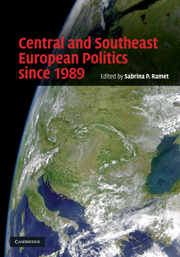Book contents
- Frontmatter
- Contents
- List of figures and maps
- List of tables
- Notes on the contributors
- Preface
- List of acronyms and abbreviations
- Guide to pronunciation of Central and Southeast European words
- 1 Central and Southeastern Europe, 1989
- 2 Central and Southeastern Europe, 2009
- Part 1 Introduction
- Part 2 Issues
- Part 3 Central Europe
- Part 4 Yugoslav Successor States
- 11 Slovenia since 1989
- 12 Politics in Croatia since 1990
- 13 Serbia and Montenegro since 1989
- 14 Bosnia and Herzegovina since 1990
- 15 Macedonia since 1989
- 16 Kosova: resisting expulsion and striving for independence
- Part 5 Southeastern Europe
- Part 6 Former Soviet republics
- Part 7 Present and future challenges
- Index
- References
11 - Slovenia since 1989
Published online by Cambridge University Press: 05 June 2012
- Frontmatter
- Contents
- List of figures and maps
- List of tables
- Notes on the contributors
- Preface
- List of acronyms and abbreviations
- Guide to pronunciation of Central and Southeast European words
- 1 Central and Southeastern Europe, 1989
- 2 Central and Southeastern Europe, 2009
- Part 1 Introduction
- Part 2 Issues
- Part 3 Central Europe
- Part 4 Yugoslav Successor States
- 11 Slovenia since 1989
- 12 Politics in Croatia since 1990
- 13 Serbia and Montenegro since 1989
- 14 Bosnia and Herzegovina since 1990
- 15 Macedonia since 1989
- 16 Kosova: resisting expulsion and striving for independence
- Part 5 Southeastern Europe
- Part 6 Former Soviet republics
- Part 7 Present and future challenges
- Index
- References
Summary
During the last twenty-five years, Slovenia has experienced deep social changes involving an economic and political transition from a socialist system, the creation of an independent state with a market economy, a liberal-democratic type of political system, favorable socio-economic trends as well as the successful integration of the new state into the world system and even into the EU regional political system. This former Yugoslav Republic, which took a risk by declaring its independence and seeking international recognition in 1991, presided over the EU in the first half of 2008. Slovenia's idiosyncratic success has resulted from various factors, with the key ones including relatively open borders to the West during the socialist regime including strong economic ties with West European countries, which contributed to lively economic and social modernization and a sounder socio-economic base than was found in many other post-socialist countries during the transition and the consolidation of a new regime; gradualism in social, economic, and political reforms; the very cautious taking of advice from international financial organizations; the relatively homogenous ethnic structure; and no substantial damage from the war in the Balkans in the 1990s.
Slovenia before 1989–90
The history of the Slovenian nation has usually been portrayed as the history of a relatively small, primarily culturally defined community living for a long time under a variety of larger, predominant nations in the framework of multinational states.
- Type
- Chapter
- Information
- Central and Southeast European Politics since 1989 , pp. 235 - 257Publisher: Cambridge University PressPrint publication year: 2010
References
- 9
- Cited by



